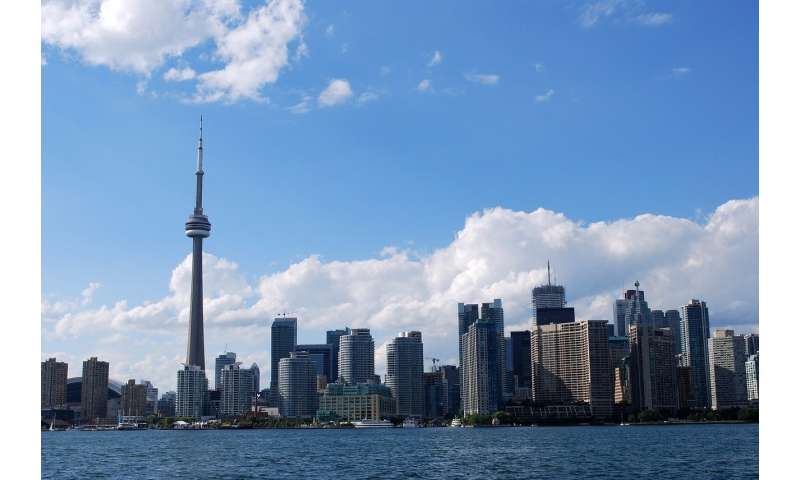International collaboration on green innovation increases the wealth of OECD cities, a new study finds

City planners and residents are usually enthusiastic about parks in cities—they beautify cities and increase quality of life.
But justifying parks economically can be a challenge. When developers eye an ideal location in a city for a condo, it can be a hard argument for a city planner to insist on a park instead. Cities are pressed for "affordable housing," and while downtown condos in major cities are rarely affordable, the supposed argument wins the day. Property tax revenues add to stretched city budgets. How do we argue for parks instead?
As a Toronto native, I found plenty of inspiration to look into this question. Like Chicago's hard-fought sprawling waterfront spaces, I have always felt that Toronto should have the same. Waterfront should be accessible to all citizens and tourists, not just private owners.
However, Toronto's over crowded harborfront is now brimming with condos right up to the water's edge. Condos have been quietly erected without public consultation and the limited space around them is primarily corporate-controlled.

Making a bad situation worse, Waterfront Toronto unveiled its plans for Sidewalk Labs (Google) to build more condos on remaining eastern harborfront lands. At an urban planning conference, I asked "What about parks?" and was condescendingly dismissed with: "parks are expensive." I was up for this challenge to defend my city.
Stunned by what I saw as an irresponsible position held by an entrusted body to work in citizens' interests, I set out to show that "parks are economic." With this new research, I show that parks are economic in the most direct way possible—green space and lower pollution (trees help to clean up pollution) are related to higher city GDP per capita.

In fact, this research debunks the myth that "economic activity"—where this implies more polluting industries and gasoline engines in cities—reflects more economic success. Now, city planners have an elegant economic argument in favor of green innovations.
However, my research goes further, showing that international city forums are a viable part of city governance and green innovation worldwide.
This quantitative study uses a sample from over 30 OECD countries consisting of 281 metro areas with a population of 500,000 or more to test how green space, pollution, innovation, memberships in international city forums, and a combination of those international memberships with innovative capacity affect city GDP per capita. The results show direct economic impact, consequential for city policy discussions. This way, a city can know how to become wealthier through innovative sustainable development.
International cooperation is valuable. Cities "share the wealth" when they engage in international city forums such as C40 Cities, complementing their governance activities. They share lessons learned about green innovations, adapt innovations to their local context, and become wealthier as a result. They are able to more successfully use existing innovative capacity for wealth-producing sustainable outcomes.
This goes to show that cities should invest in research and development guided by experience and knowledge shared in international sustainability forums. Cities learn what to invest in and how to implement green innovations. While there are substantive benefits to green innovations, being one of the cities adopting the latest well-understood green innovations increases attractiveness.
Overall, this research debunks the "economy versus environment" dichotomy for cities. Instead, societies that offer cleaner environments have healthier economies.
This story is part of Science X Dialog, where researchers can report findings from their published research articles. Visit this page for information about ScienceX Dialog and how to participate.
More information:
de Lange, D. E. (2020). International isomorphism, sustainable innovation and wealth for OECD cities. Journal of Urban Affairs, published online April 2. doi.org/10.1080/07352166.2020.1730698
Bio: Deborah E. de Lange is an Associate Professor of Global Management Studies in the Ted Rogers School of Management, Ryerson University. She is also faculty in Ryerson University's Yeates School of Graduate Studies and in the Environmental Applied Science and Management graduate program. She is also an Affiliate Researcher at the Center for Research in Sustainable Supply Chain Analytics, Rowe School of Business at Dalhousie University. She is currently a Visiting Scholar at Massey College at the University of Toronto. She has been Vice Chair of the North America Chapter of UN PRME and on Executive Committees for Academy of Management. Her research is in sustainable development as per the United Nations Sustainable Development Goals and is published in numerous peer reviewed journals, books, and book chapters. Her books include: Cliques and Capitalism: A Modern Network Theory of the Firm, Research Companion to Green International Studies, and Power and Influence: The Embeddedness of Nations.